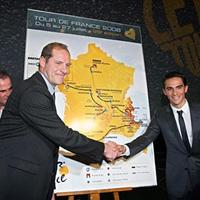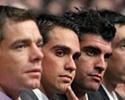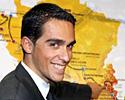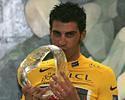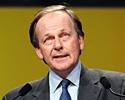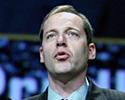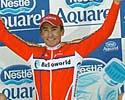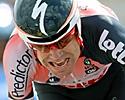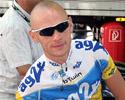
Recently on Cyclingnews.com |
Tour de France News for October 26, 2007Edited by Sue George with assistance from Susan Westemeyer A Grand Tour with minimal transfers and mythical mountainsBy Gregor Brown in Paris
The 95th Tour de France will be a Grand Tour of modest terms and with mythical mountains stages. The 2008 French Grand Tour was presented today in Paris with minimal transfers and with the inclusion of the famed mountain climbs of Hautacam and L'Alpe d'Huez. The route, 3,554 kilometres over 21 stages, will run from July 5 to 27. "We have wanted a first week of racing with much more rhythm," explained Tour Director Christian Prudhomme. "With no prologue, an uphill finish that will suit different types of sprinters at the end of stage one, with a short time trial on stage four and the first mountain [Super-Besse] only 48 hours later, we have decided to change the scenario." The 95th Tour starts on Saturday with its Grand Départ in the cycling-rich region of Brittany without the usual prologue start, as has been favoured by the ASO (Tour organizers) for the last 40 years. (Read news item Tour de France 2008 to start in Brest and visit Italy. It then travels in a counter-clockwise direction, hitting the Pyrénées and then the Alps before its traditional finish on the Champs-Élysées, Sunday in Paris. "It is not good for the cyclists when there are a lot of transfers, so this route looks favourable for us," noted the 2007 Tour Champion, Alberto Contador. "There are not huge jumps from the north to the south, and this will make the race more comfortable." Keeping in its modest terms, the 95th edition will contain one time trial of 29 kilometres in Cholet and a second one – of normal Tour length – on the penultimate day of 53 kilometres, from Cérilly to Saint-Amand-Montrond. Though the minimal transfers presented by the ASO on Thursday are favoured universally by cyclists and team staff, the lack of crono kilometres – 82 in total – was not favoured by everyone. "Maybe I might have to modify my training a little," said Cadel Evans, second in the 2006 Tour, to Cyclingnews when he heard of the minimal time trial kilometres. The modesty of the 2008 edition will be forgotten when riders hit the high peaks near Spain and Italy; there are a total of five mountain stages, four of which finish in an upward trajectory. Planned is a return to Hautacam (stage 10), a romp up the 2802-metre Col de la Bonette-Restefonds (stage 16) and the mythical Alpe d'Huez (stage 17). There are a total of 10 flat and four medium mountain stages that combine with the aforementioned five mountain and two time trial stages to form the 21 stages.
The final bit of intrigue provided at Thursday's presentation was the lack of time bonuses on offer. Riders in the top placings will not be award with seconds taken off their overall time when competing in intermediate sprints and stage finishes. This will change the fight amongst the sprinters who are jockeying for the maillot jaune in the first few stages, and we may not see the overall lead change hands as often. "People like the Tour," Prudhomme commented in regards to this year's scandals that involved Moreni, Vinokourov and Rasmussen. "The public has booed Michael Rasmussen, that's a good thing! They have told us: keep courage, please fight for the Tour's survival. We have listened to this message and we want to meet their expectations. ... We want to restore romanticism." The Tour de France will be starting in the region of Brittany for the sixth time and in the town of Brest for its third time. Fausto Coppi won his last stage when the race began in the costal town in 1952 and Belgian Eddy Merckx took honours when it hosted its last stage start in 1974. 34 years later, cyclists will face 195 kilometres, ending in Plumelec. Two more stage starts will be hosted by Brittany, Auray to Vannes (stage 2) and Saint-Malo to Nantes (stage 3). Although the Tour does not have a prologue time trial to start next year's edition it will feature a short individual test on stage four. The 29-kilometre run starting and ending in Cholet will be seriously contested by the general classification men and see the wearer of the maillot jaune changes hands. Its distance contrasts dramatically to the last two years: 2006 had its first time trial with a distance of 52 kilometres and 2007's first time trial was held over 54 kilometres. "It is good that there are less time trial kilometres in the 2008 race," continued Contador to Cyclingnews. "However, it would be better if that short time trial was the second and not the first of the race. I prefer long time trials first." To read the complete preview, click here. Contador ready for different TourBy Gregor Brown in Paris
Spaniard Alberto Contador is ready for a "different race" in the 2008 Tour de France. The 2007 champion attended the race's presentation Thursday in Paris and was surprised with what he saw, especially the short first time trial and high-mountain pass of Cole de la Bonette. "We have to approach the stage with respect," said Alberto Contador to Cyclingnews of stage 16 that covers the highest pass in Europe. "I think that it [the high pass] will make for a different race, and it is a good thing." He confirmed that he will be out to defend his title in 2008, even if changing from Discovery Channel to Astana. "The Tour will be the most important objective for me next year. I will train all-out for the Tour. I will have to adjust my training to be ready for the mountains. It is very important to preview these climbs." Pereiro: "The hardest Tour"By Gregor Brown in Paris
After only being recently crowned the 2006 Tour Champion, Oscar Pereiro of Caisse d'Epargne attended the 2008 Tour de France presentation at the Palais des Congrès in Paris. The 30 year-old Spaniard considers the race to be one of his hardest yet. "Next year will be very hard," he said to Cyclingnews. "There will not be a prologue on the first day and the first time trial is very short, so there is not really a normal time trial until the end of the Tour. After [the first time trial] we enter the Massif Central and it will be hard on the legs, very hard." He was impressed with the mountain stages, particularly those in the Alps. "The stages in Alps will be incredible, also the time that we will spend in Italy. The stage from Cuneo [stage 16] will be very difficult; it is a short stage but we will be climbing the whole stage." Stage 16 will be the Tour de France's first run over the Italian pass of Col de la Lombarde and the first to the town of Jausiers, while taken in the seldom-used Col de la Bonette. The riders will face this moon-like landscape on Europe's highest road, at 2,802 metres (8,295 feet), before the 23 kilometre run to the finish. Like his colleagues, he was happy to see minimal transfers. "For us it is better this way. It allows us to have more rest. However, I think this will be the hardest Tour that I will do. I have ridden four and this will be my fifth – and the hardest. It is clear that a rider who goes well in the climbs will do well in the 2008 Tour. ... I will have to train more and more in the mountains to be ready." Clerc: "No team has a guaranteed start"
By Jean-François Quénet in Paris
Asked whether or not Astana's chances to ride the Tour after signing defending champion Alberto Contador have increased, Clerc stood firm: "No rider and no team has a guaranteed start at the 2008 Tour de France. Only riders with a biological passport will start, that's all I can say. But we don't have any link whatsoever with the ProTour. Nobody will oblige us to line up certain teams!" The president of ASO doesn't want to restrict the fight against doping to the biological passport though. "We won't give any freedom to the riders after the start of the race," he added. "We also have the evidence that traditional doping tests work. It has worked with Mr. Vinokourov, with Mr. Moreni, with Mr. Kashechkin, with Mr. Mayo. The biological passport will prevent the important part of the doping during the six weeks before the race. There's no universal answer to the plague of doping but it's going to be very hard for the cheats to do what they have done in the past." Prudhomme worked for more open and more romantic race
By Jean-François Quénet in Paris
As event director, Christian Prudhomme put his personal mark on the course of the 2008 Tour de France. "We have wanted a first week of racing with much more rhythm," he said. "With no prologue, an uphill finish that will suit different types of sprinters at the end of stage 1, with a short time trial on stage 4 and the first mountain (Super Besse) only 48 hours later, we have decided to change the scenario. "There are less big climbs but there are some of the best ones with the [stage 10] Tourmalet, [stage 16] La Bonette-Restefonds with its summit at 2,800 meters that has only been climbed four times in the Tour history and [stage 17] L'Alpe d'Huez," said Prudhomme. "There is also more harmony on the course with the climbs more distant from each others. We also wanted to go back to the south in the Alps and at the end, everything will possibly be open at the bottom of L'Alpe d'Huez." Along with a new route came a new logo for the Tour de France. It features a heart with the letters of "Tour toujours" which translates to "The Tour forever." "People like the Tour," Prudhomme said. "This year in London, in Belgium, in Burgundy, and even more at the end of the Tour, for example in the Périgord after all the problems that occurred, the crowd gave us wonderful signs of encouragements. The public has booed Michael Rasmussen, that's a good thing! They have told us: keep courage, please fight for the Tour to survive. We have listened to this message and we want to meet their expectations. "People want the Tour, people don't want doping," said Prudhomme. "We believe in the biological passport will offer them the Tour without doping. I'm convinced cycling is on its way to becoming an example for other sports." Talking about both the course and the new anti-doping policy, Prudhomme used a most magical French word, "We want to restore romanticism." Soler likes high mountain stages
2007 polka-dot jersey winner Mauricio Soler was a guest of honor at the 2008 Tour de France route presentation Wednesday morning in Paris. Soler also won the mountain stage to Briançon The Columbian traveled to Paris by car after only recently undergoing a minor operation on his nose that should help him perform even better in 2008. Along with Team Barloworld manager Claudio Corti, Soler was obviously interested in the Tour route that will start in Brest on July 5 and end in Paris on July 27. "It's not really up to me to judge the route of the Tour de France but I have to say that after a first look I like it," Soler said modestly. "The amount of time trials has been reduced because there's no prologue and no team time trial. There are lots of climbs but I wouldn't say it's a particularly tough Tour route. Fortunately for me there are lots of climbs over 2,000 metres and I'm used to racing and breathing at that altitude. There'll be lots of chances for me to attack." "The mountains are interesting, above all the Alpe d'Huez – I would like to win that stage," Soler said to Cyclingnews. Corti was hopeful for Team Barloworld's chances at the 2008 Tour. "We’re building a team that will strong in every kind of race. We've shown the professionalism of our team and riders this year and I'm hopeful that the Tour organizers will remember that when they decide which teams will take part in next year's race." South African Robbie Hunter also won a stage in 2007. Mixed feelings among the Belgian team riders
"I cannot say if I can win on this course," said this year's second-place finisher Cadel Evans of Belgian team Predictor-Lotto on hln.be. "The Pyrenees before the Alps makes no difference to me. I think the second part will be important for the GC. I will concentrate on the second part, like the majority of the GC riders. But you can lose the Tour in the first half. I found that out in the previous edition. I might have been able to win the Tour, who knows?" Evans applauded the lack of long transfers and said, "That is good for everyone. Riders, journalists, mechanics ...... that gives more time to rest. It is good for the quality of the competition." "Lombardia went well and gave me just enough for the ProTour," continued Evans to Cyclingnews. "I was not able to win [the race] but for the ProTour classification, it was good. I will race the 2008 strictly for the win and not think of the 2008 ProTour classification. "I don't think it changes much," he said of the lack of a prologue. "There will not be too many kilometres of time trialing, lots of climbs, no team trial and no prologue. There are 29 and 53 kilometre time trials – I will have to see the profile of those before we decide, but it looks to me to be more of a climbers' Tour." Hendrik Redant, Sport Director at Predictor-Lotto, was not totally happy. "For a team with a sprinter [McEwen] and a captain for the GC [Evans], it will be complicated," he said. "The support riders will have a lot of work. We will have to rely on the work of other teams. The reduction of the number of time trial kilometers is a slight disadvantage for Evans." His comments were echoed by Marc Sergeant, Lotto's team manager, who spoke to Sporza. He also called the reduced number of time trial kilometers a disadvantage and noted that "Because there is no prologue and because of the win in Brittany, I expect a nervous start. We must be attentive from the very start." He added, "The key to the Tour will lie in the last week, with the only really long time trial and the stage to Alpe d'Huez." "With Evans, we have finished eighth, fifth and now second. Next year we want to win." The lack of a prologue "is an advantage for Tom Boonen," said Quick.Step-Innergetic manager Patrick Lefevere, also on Sporza. "Whether the green jersey is really a goal for us next year is something we can't say at this point. We will have to look at the makeup of our team next year. But not only green is possible. In such an opening week you can hold on the yellow jersey for a long time. Because if you win the first stage, you will keep it for perhaps a week. But the opening can bring disappointment, too. Who can say how a mass sprint will turn out?" "Our team is strong enough to put its stamp on the Tour," he concluded. "Steegmans has my trust, and Rosseler can go with an escape group." Breukink says decision will fall on Alpe d'HuezIt is a Tour for the climbers, according to Rabobank team manager Erik Breukink. "No prologue, no time bonuses and a short first time trial." The latter is especially of interest to his riders Denis Menchov and Thomas Dekker, who are specialists in such middle-length time trials, he told Telesport.nl. "The mountain stages are especially difficult, with the ride to Alpe d'Huez as the main point. I think that that is where the decision will fall." Not only is the climb itself a classic, "that is the only stage with three really hard climbs." Of the climb to the Prato Nevoso in Italy, he said, "That is unknown territory." Gadret remembers 2007 Tour as nightmare and hopes for better daysBy Jean-François Quénet in Paris
Cyclo-cross star John Gadret who won the GP Gippingen and the Tour de l'Ain this year with Ag2r gave his comments after the launch of the 2008 Tour de France, a race he took part in for the first time this year. "It's been an absolute nightmare," he remembered. "I felt I was in hell because it was going so fast. I hope the biological passport is a solution to the problem. It is a weight upon us to handle the doping environment when we have nothing to do with it." His team-mate, 37 year-old Stéphane Goubert also was optimistic. "The biological passport will restore the credibility of the Tour de France and the bike riders," he said. "It's good thing. My only regret is that it's not extended to all the sports from the start. But at least there won't be suspicions on the riders anymore. We hope that this is the solution, but the other controls [will] have to be well done as well. There is a real consciousness that cheats will now get caught very quickly if there are still some around." Thomas Voeckler gave had a more skeptical opinion. "I'm past the age to believe in the word 'renewal' for cycling because I've heard it too many times already and that didn't prevent new scandals from happening. Many promises haven't been kept in the past. I don't think the biological passport is the miraculous solution. I believe in it without being too excited about it. If it's done properly, it's a very good measure. Regular blood checks are more efficient than controls. Nonetheless, Voeckler showed some optimism. "I truly hope for a cleaner cycling though. If it has to become better, it's now. There is a common wish that didn't exist before. I want this to work for the public who still follows us and for the young riders who begin cycling now. I can understand that some people are sick of hearing promises. [Alexander] Vinokourov had signed the ethical charter, right? The biological passport is more concrete though." Current anti-doping clean-up efforts are reminiscent of the clean-up in French cycling that followed the Festina scandal in 1998, and many are hoping for better days ahead. (All rights reserved/Copyright Future Publishing (Overseas) Limited 2007) |

